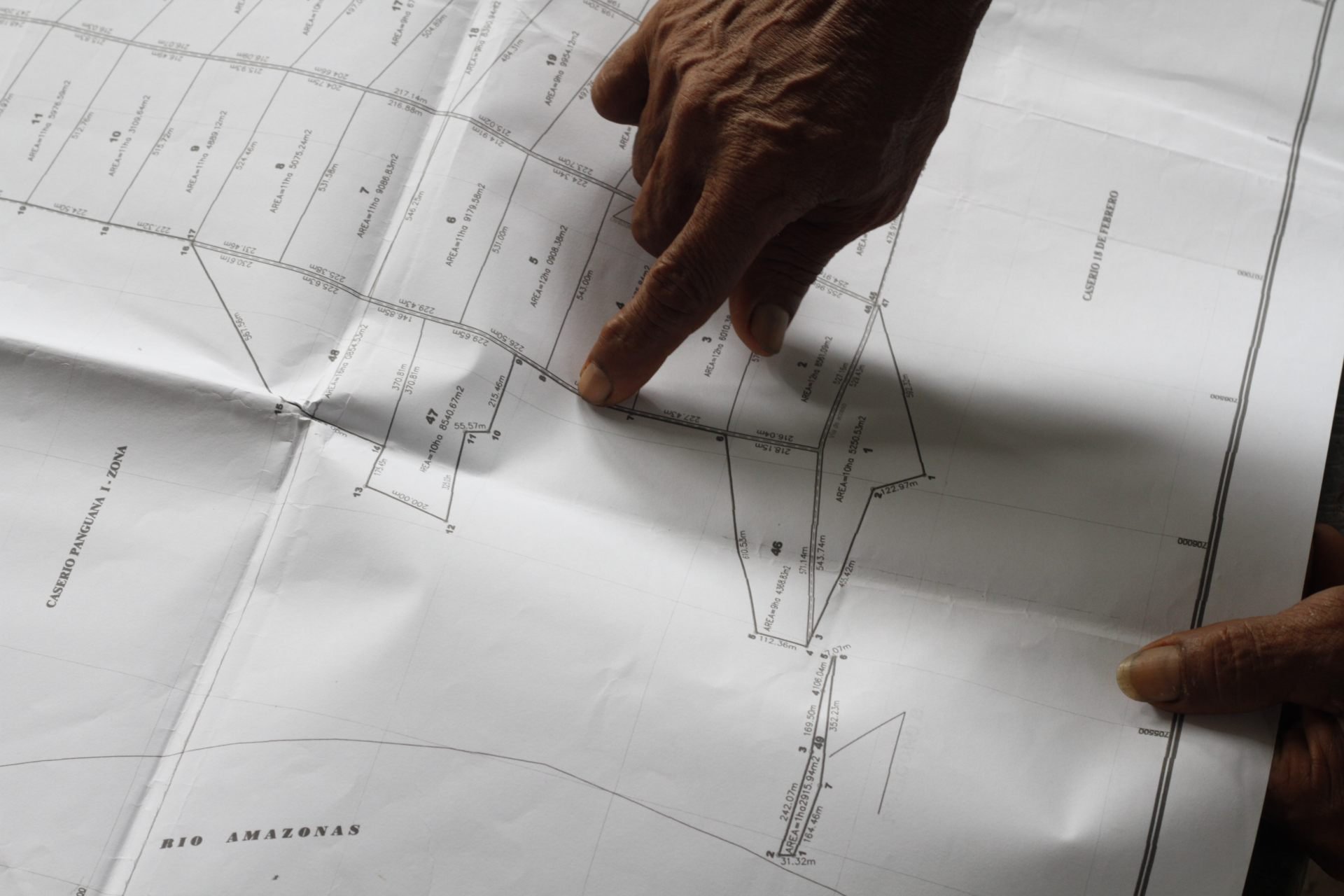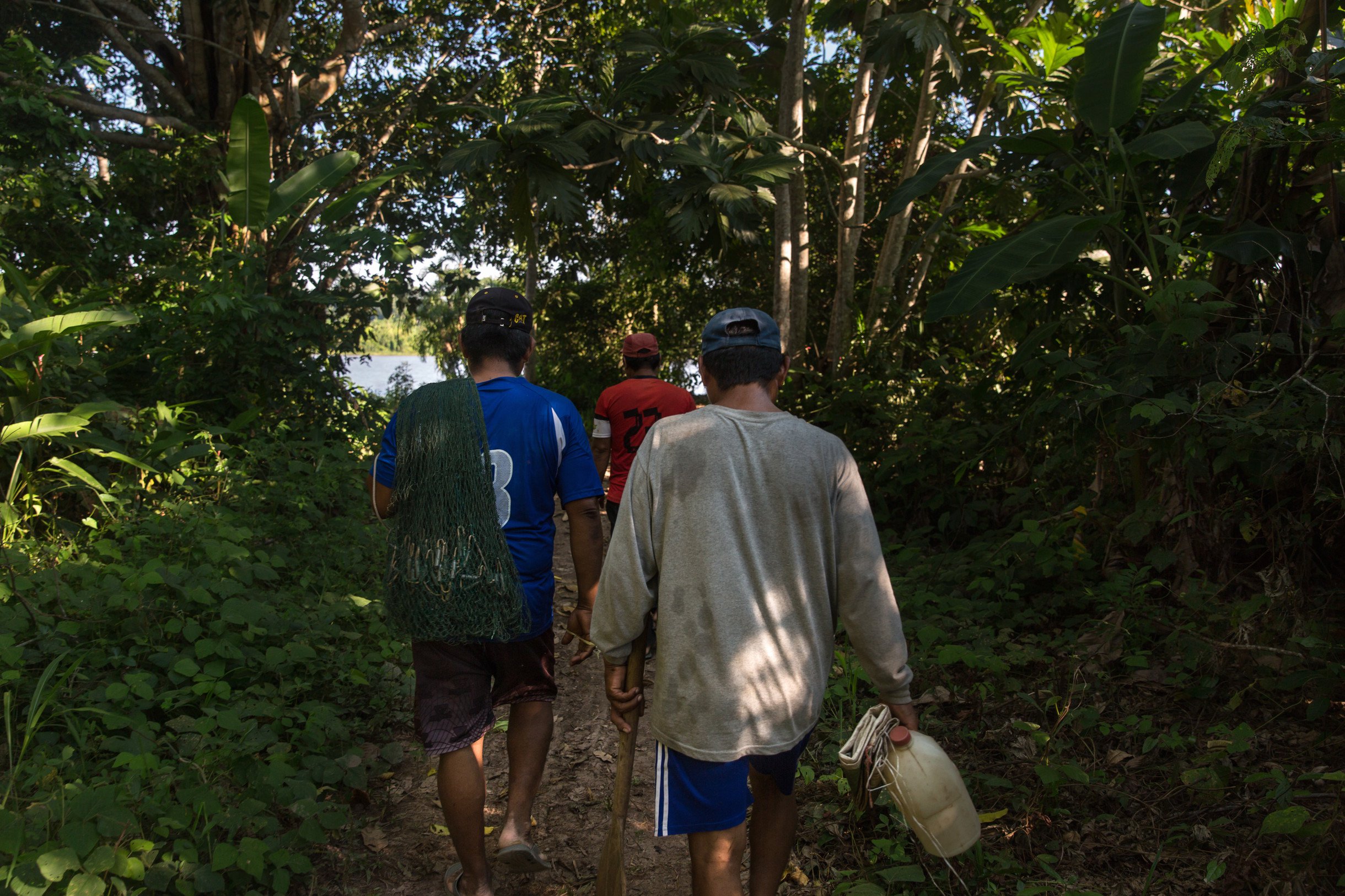Industrial-level oil palm and cacao plantations, some established through corrupt land-titling, are destroying old-growth forest and displacing farmers and indigenous people.
Cutting down the Amazon forest for agribusiness plantations destroys trees and displaces farming and indigenous communities. Environmental and human rights defenders say this deforestation is bad for the planet and violates the rights of people living in and near the forest. But how much does deforestation contribute to the greenhouse gas emissions that are driving climate change? And how can forest people defend their land and rights?
Oxfam has been studying these questions in Peru, where new data show that large-scale oil palm plantations in Peru are destroying fragile forests and have released 2,859,535 metric tons of climate-warming greenhouse gas emissions in 20 years. These emissions are equivalent to producing enough energy to meet the annual needs of more than four million households.
The study, titled “Agribusiness fueling the climate crisis in Peru,” analyzes land use and estimates carbon emitted in 89,725 hectares (220,000 acres) affected by large scale oil palm plantations in four areas of Peru. The report also estimates that in the northern province of Loreto, large-scale cacao production on 5,458 acres since 2013 released 87,040 metric tons of greenhouse gases, roughly equivalent to the amount exhausted by 69,000 passenger vehicles in a year.

This is the first study in Peru that analyzes net carbon loss in forest areas cleared and replanted with oil palm and cacao plantations. It estimates these cleared and replanted areas have an average net loss of 72 percent of stored carbon.
Oxfam plans to use the findings in the report to encourage the government to help farming and indigenous communities to preserve the primary growth Amazon forest areas under their control, help them gain and retain legal title to these lands, and reduce further deforestation and greenhouse gas emissions.
Palm oil and deforestation
Although palm oil represents less than one percent of Peru’s exports, production in Peru is increasing quickly over the last 10 years. International firms are coming to Peru to grow the crop because major producing countries like Indonesia and Malaysia are running out of forests and the companies are being criticized for deforestation and destruction of biodiversity. Demand for palm oil, used in a wide variety of food products, cosmetics, and even soap, will put more pressure on Peru’s forests.
As companies target forest areas in Peru, government officials ignore native communities and small-scale farmers seeking land title while agribusiness firms, many of them foreign owned with deep pockets, can quickly acquire title to lands already claimed by indigenous and other communities. And there is little enforcement of laws that prohibit use of forest lands for agribusiness.

These corrupt land deals are sometimes accompanied by violent intimidation of local environmental, indigenous, and human rights defenders. “We’re subject to threats, and attempts on our lives,” says Efer Silvano, a leader of the indigenous Shipibo community Santa Clara de Uchunya in the department of Ucayali. Santa Clara de Uchunya recently was granted a claim to 3,920 acres of land already taken over and cleared by an oil palm plantation called Ocho Sur, and the community is claiming more land lost to the plantation.
Social cost to land grabs
Clearing forests that emit carbon has a significant global cost as it contributes to climate change, but in Peru there are serious social costs as well as local environmental damage endured by farmers and indigenous communities. “It’s sad that they took our ancient territory,” Silvano says, explaining that Shipibo people hunt, fish, gather wild fruits and vegetables and medicinal plants from the forest. Without it, they have lost a vital source of livelihood. He says local officials “don’t understand how we live,” and prioritize the needs of large businesses over the basic rights of indigenous communities.
Nevertheless, the community has brought its land case to the Constitutional Court in Lima, Peru’s highest court. Recently, Oxfam and our partner the Federation of Native Communities of Ucayali launched an international petition with the Lands Right Now campaign, and gathered more than 13,000 signatures asking Constitutional Court judges to rule in favor of the community.

In the northern Loreto province, the farming community Panguana I secured a communal land title for an area near the Amazon river, and its neighbor Panguana II is on the verge of acquiring title to an area that includes a community cemetery within a land concession granted to a cacao plantation run by Tamshi SAC. Oxfam’s partner the Peruvian Society for Environmental Rights (SPDA) helped these communities to obtain their titles, complying with all the legal procedures required by the local government.
In San Martín department, Oxfam’s partner Paz y Esperanza helps communities use drones and geo information systems to monitor their territory. This allows them to alert the authorities at the first sign of illegal deforestation or land invasion.
Despite these indications of progress, areas affected by these types of agribusiness activities and unaccountable local officials continue to affect the forest and other resources on which farming and indigenous communities depend for their survival.
Climate justice
Data from the new report will for the first time help Peru to understand the net effect of clearing forests for agribusiness. Oxfam plans to use the findings of the new report in Peru to open up discussions with the Ministry of Environment as it considers policies that will help the country meet its commitments in the Paris Accords and reduce its greenhouse gas emissions by 40 percent by 2030. In addition, Oxfam and partners in Peru hope the report will help them pressure the Ministry of Agriculture to tighten up its forestry policies and improve forest protection measures.

Oxfam’s partners in Peru are also promoting the findings of the report in social media in order to raise awareness of the need to conserve forest resources and promote understanding of how clearing forests for large-scale agriculture affects greenhouse gas emissions.
Efforts to help small-scale farmers and indigenous people protect their land rights and access to the resources they need to survive, as well as pushing for policies that reduce greenhouse gas emissions are part of Oxfam’s global effort to fight climate change. Oxfam works with the most vulnerable to help them secure their rights and adapt to the negative effects of climate change, and encourages countries and companies responsible for the largest greenhouse gas emissions to bear their fair share of the cost while committing to reduce their own emissions.
“When we help indigenous communities defend their territories, we are also addressing the climate crisis,” says Clemence Abbes, Oxfam’s project officer in Peru. “By securing the territories of local communities, and ensuring they can live sustainably on these lands, we protect the Amazon from further deforestation and limit releases of greenhouse gases.”
